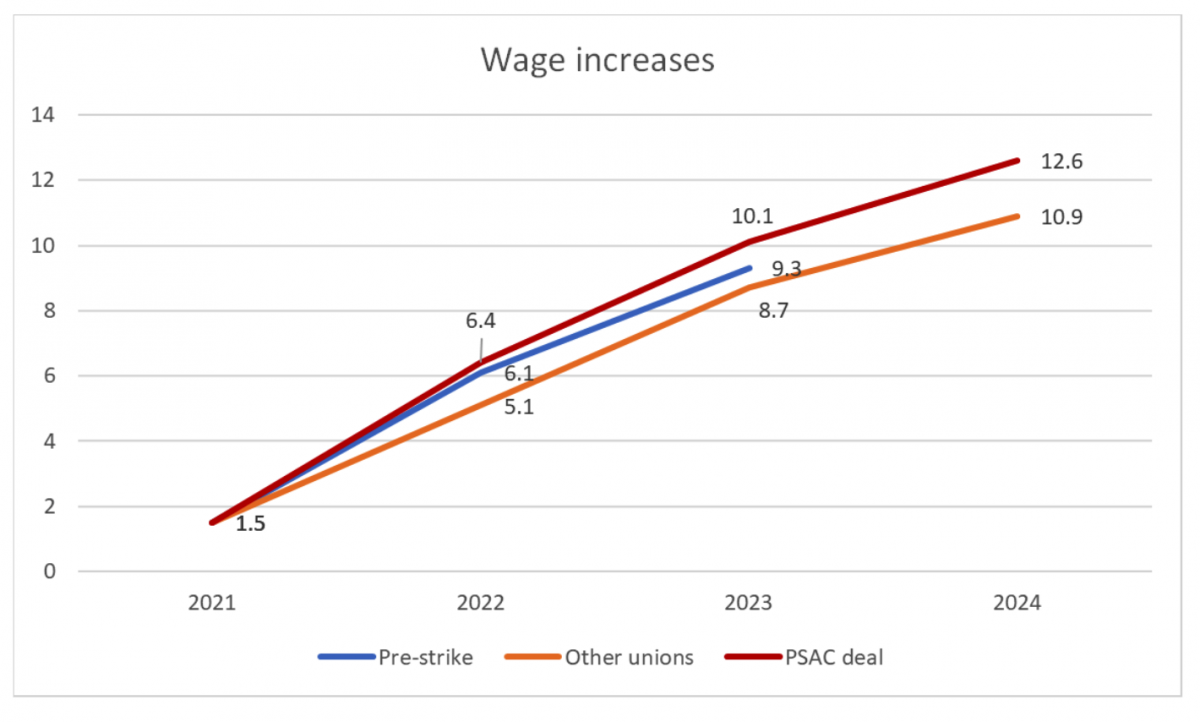In the hours after reaching a deal with Treasury Board, we shared with PSAC members the highlights of the wage increases and remote work language that were negotiated.
As we prepare ratification kits that contain the full details of the new agreements to share with you in the coming days, we’d like to provide more details and clarification on the key improvements we secured in this round of bargaining.
Strike action improves final wage offer and other benefits
Beating the pre-strike three-year offer
It took getting a strong strike mandate and serving notice to strike for the Liberal government to finally offer a wage proposal that they had publicly supported for months, following the Public Interest Commission’s recommendations, but refused to actually put on the table.
Then they refused to move from that – or move on anything else. Our national strike made all the difference. Each day of the strike built the pressure we needed to secure more gains at the table.
This was the employer’s offer as the strike began compared to what we secured for those first three years they offered:
|
Year of the agreement |
2021 |
2022 |
2023 |
Total compounded increase |
|
Treasury Board offer |
1.5% |
4.5% |
3% |
9.3% |
|
PSAC tentative agreement |
1.5% |
4.75% |
3.5% |
10.1% |
|
Compounded gains for members |
N/A |
+0.3% |
+0.8% |
+0.8% |
Securing increases for a fourth year in line with projected inflation
We moved the dial on the government’s pre-strike offer, but we needed more to reach an agreement.
That’s why we negotiated a fourth year into the agreement that meets projected inflation. The Bank of Canada projects inflation to average 2.3% in 2024, so we locked in an increase of 2.25% for that year of the agreement. This only became possible in the second week of the strike.
|
Year of the agreement |
2021 |
2022 |
2023 |
2024 |
Total |
|
Wage increase |
1.5% |
4.75% |
3.5% |
2.25% |
12% |
|
Total compounded wage increase |
1.5% |
6.4% |
10.1% |
12.6% |
12.6% |
Improving on other agreements
We didn’t just improve on the employer’s overall offer through our strike, we also secured increases significantly above agreements already signed by other federal public service unions over that same period:

A $2,500 pensionable lump sum payment averaging 3.7% of salary
As part of their pre-strike offer, the government also tabled a non-pensionable lump sum payment of $500. After we began our strike action, we secured a $2500 lump sum – and made it fully pensionable.
For an average member making $67,305 a year, it represents 3.7% of salary, and a lot more for the thousands who make less than that.
This lump sum payment will be applicable to all members of the bargaining unit employed at the time of signing the agreement. For the 15% of PSAC members nearing retirement, the pensionable lump sum payment will contribute to their average salary for their best five years of service and increase their overall pension payments in retirement by $500 per year.
It could be worth over $10,000 in increased pension payments depending on how many years a worker collects their pension.
The dollars add up – $23,000 more on average in your pocket
For PSAC members in the TC, SV, EB, and PA groups, a 12.6% wage increase would add on average of $8,473 to your base salary by 2024.
If you add up the yearly salary increases, along with the $2,500 lump-sum payment, the average PSAC member will receive an additional $23,000 over the life of the agreement based on an average Treasury Board member’s salary of $67,305.
|
|
2020 |
2021 |
2022 |
2022* |
2023 |
2023** |
2024 |
2024*** |
|
Individual wage Increase |
N/A |
1.5% |
3.5% |
1.25% |
3% |
0.5% |
2% |
0.25% |
|
Cumulative wage increase (compounded) |
N/A |
1.5% |
5.1% |
6.4% |
9.6% |
10.1% |
12.3% |
12.6% |
|
Average increase ($) |
N/A |
$1,010 |
$3,401 |
$4,284 |
$6,432 |
$6,801 |
$8,283 |
$8,473 |
|
Average Salary |
$67,305 |
$68,315 |
$70,706 |
$71,589 |
$73,737 |
$74,106 |
$75,588 |
$75,777 |
* The 4.75% increase in 2022 is made up of a 3.5% general economic increase as well as an additional 1.25% wage adjustment that compounds the economic increase.
** The 3.5% increase in 2023 is made up of a 3% general economic increase as well as an additional 0.50% wage adjustment that compounds the economic increase.
*** The 2.25% increase in 2024 is made up of a 2% general economic increase as well as an additional 0.25% wage adjustment that compounds the economic increase.
Additional wage increases and benefits for specific bargaining tables
Prior to taking strike action, the government adamantly refused to budge on any of the other improvements and benefits we had tabled. By the end of the strike, at each of the TC, EB, SV, and PA tables, PSAC won wage adjustments for specific jobs that have fallen significantly below their counterparts in other sectors. We also negotiated better leave provisions and increases to allowances.
None of these gains would have been possible without taking strike action and pressuring the government to deliver better.
You can read more about the table-specific gains here:
Strongest remote work protections in the federal public service
Prior to taking strike action, we had not made any gains on remote work as the government dug in on their position. But that all changed by the end of the strike. Our goal was to get the improvements we secured directly into the collective agreement. Instead, as part of the give and take of every round of bargaining, we agreed to have those improvements implemented as part of a letter of agreement that sets us up to win the full victory in our next contract.
PSAC members will now be protected from arbitrary decisions about remote work. We have negotiated language that requires managers to assess remote work requests individually, not by group, and provide written responses that will allow members and PSAC to hold the employer accountable to equitable and fair decision-making. Having all remote work requests reviewed on an individual basis will prevent future "one size fits all" type mandates like the government announced in December last year.
That means employee rights around remote work arrangements will be protected through a grievance process, and grievances that are not settled prior to the final step of the grievance process can be referred to a new joint union-management panel for review in each department to address issues related to the employer’s application of the remote work directive in the workplace.
PSAC and Treasury Board have also agreed to create a joint committee to review and update the outdated telework policy.
Once the agreement is ratified, PSAC members can begin to challenge decisions on their remote work arrangements based on the new language negotiated, and the union can begin working with the employer to review the overall policy.
Big gains by using our collective bargaining power and strike action
PSAC secured the strongest collective agreement in the federal public service that raises the bar for our members and all workers in Canada.
Because over 100,000 PSAC members came together on the picket lines to demand better, you secured:
- A better first three-year wage offer
- A fourth year with full inflationary increases
- A $2500 pensionable lump sum payment
- Wage adjustments, along with better leave provisions and increased allowances
- The strongest remote work protections in the federal public service
- Protections against contracting out
- Safer and more inclusive workplaces
- Seniority protections
 Member Login
Member Login



